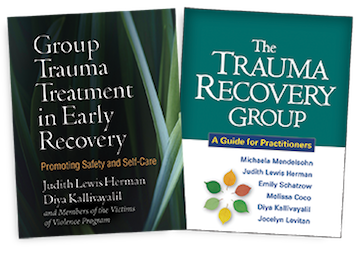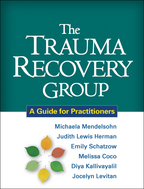The Trauma Recovery Group
A Guide for Practitioners
Michaela Mendelsohn, Judith Lewis Herman, Emily Schatzow, Melissa Coco, Diya Kallivayalil, and Jocelyn Levitan
A Paperback Originale-bookprint + e-book
A Paperback Original
orderFebruary 16, 2011
ISBN 9781609180577
Price: $44.00193 Pages
Size: 8" x 10½"
Check out a special package offer including this title!

Sign up for emails on upcoming titles on Trauma & PTSD (with special discounts)!
“This teaching manual is a well-written, easy-to-read, 'how-to' book on The Trauma Recovery Group (TRG)....This book is easy to read, thoughtfully written, and well organized and achieves its stated goals and objectives. The reader is not required to have previous knowledge and skills in group psychotherapy or interpersonal violence. I would highly recommend it to anyone considering starting a focused psychotherapy group....I congratulate the authors on writing an effective training manual for TRG and providing useful information and valuable tools for other group therapists.”

—Journal of Nervous and Mental Disease
“Provides clinicians with a comprehensive theoretical, conceptual, and practical framework for facilitating trauma-informed groups, and with a step-by-step manual that guides the worker from intake and screening, through each group session, to termination....This workbook is written for clinicians by clinicians. It is an extremely accessible text, and is as much a guide to solid group work practice as it is anything....A stellar resource for social group workers who wish to facilitate trauma-informed groups. It combines a social action and social justice approach to psychodynamic group psychotherapy, and incorporates the skills and values of mutual aid. This book is equally at home on the shelves of mental health agencies that serve trauma survivors, as it is on the syllabi of MSW classes that teach about trauma and intimate partner violence. It is thorough, thoughtful, and arguable, on of the finest texts on trauma-informed practice that I have come across in recent memory.”

—Social Work with Groups
“Written by expert clinicians and undisputed leaders in the field, this wonderful book provides a detailed description of the 'whys' and 'hows' of group treatment for trauma survivors. The authors' relational approach has a demonstrable empirical basis that sets a new standard for clinicians. The book is sure to produce a splash in psychology, psychiatry, and social work—and using it with clients will yield enduring benefits. If you do groups with trauma and abuse survivors, buy this book.”

—John Briere, PhD, Department of Psychiatry, Keck School of Medicine, University of Southern California
“This comprehensive resource adds significantly to the available resources on treatment for trauma, walking the therapist through the entire process of group-based exposure and trauma processing. The group format is especially important for the traumatized—it provides a context in which to give and receive support and feedback and to break the isolation and shame associated with trauma. Bravo for this exciting new treatment contribution!”

—Christine A. Courtois, PhD, ABPP, private practice (retired), Washington, DC; consultant and trainer, trauma psychology and treatment, Bethany Beach, Delaware
“Presenting a well-known group treatment for trauma survivors, this book makes a substantial contribution. The goals and structure of the therapy are described in a clear and accessible way so that providers of various levels of experience can implement it. Sensitivity to the relational aspects of trauma recovery pervades the book and is evident in the careful attention to group interactions, elements of effective co-leadership, and the role of supervision. This principled, practical guide is steeped in clinical wisdom accumulated over years of experience. There is no false step in this book.”

—Marylene Cloitre, PhD, Associate Director of Research, National Center for PTSD Dissemination and Training Division; Department of Psychiatry and Behavioral Sciences, Stanford University
“A comprehensive, practical, evidence-based guide. This volume provides everything needed to successfully conduct the Trauma Recovery Group. The book is unique in combining theory, numerous clinical examples, outcome data, and reproducible forms for everything from advertisement to evaluation. The authors are respected, experienced clinicians whose scientific approach and clinical skills shine throughout the book. It's a trauma clinician's dream come true.”

—Elizabeth S. Bowman, MD, Adjunct Professor, Department of Neurology, Indiana University, and private practice in psychiatry
—Journal of Nervous and Mental Disease
“Provides clinicians with a comprehensive theoretical, conceptual, and practical framework for facilitating trauma-informed groups, and with a step-by-step manual that guides the worker from intake and screening, through each group session, to termination....This workbook is written for clinicians by clinicians. It is an extremely accessible text, and is as much a guide to solid group work practice as it is anything....A stellar resource for social group workers who wish to facilitate trauma-informed groups. It combines a social action and social justice approach to psychodynamic group psychotherapy, and incorporates the skills and values of mutual aid. This book is equally at home on the shelves of mental health agencies that serve trauma survivors, as it is on the syllabi of MSW classes that teach about trauma and intimate partner violence. It is thorough, thoughtful, and arguable, on of the finest texts on trauma-informed practice that I have come across in recent memory.”
—Social Work with Groups
“Written by expert clinicians and undisputed leaders in the field, this wonderful book provides a detailed description of the 'whys' and 'hows' of group treatment for trauma survivors. The authors' relational approach has a demonstrable empirical basis that sets a new standard for clinicians. The book is sure to produce a splash in psychology, psychiatry, and social work—and using it with clients will yield enduring benefits. If you do groups with trauma and abuse survivors, buy this book.”
—John Briere, PhD, Department of Psychiatry, Keck School of Medicine, University of Southern California
“This comprehensive resource adds significantly to the available resources on treatment for trauma, walking the therapist through the entire process of group-based exposure and trauma processing. The group format is especially important for the traumatized—it provides a context in which to give and receive support and feedback and to break the isolation and shame associated with trauma. Bravo for this exciting new treatment contribution!”
—Christine A. Courtois, PhD, ABPP, private practice (retired), Washington, DC; consultant and trainer, trauma psychology and treatment, Bethany Beach, Delaware
“Presenting a well-known group treatment for trauma survivors, this book makes a substantial contribution. The goals and structure of the therapy are described in a clear and accessible way so that providers of various levels of experience can implement it. Sensitivity to the relational aspects of trauma recovery pervades the book and is evident in the careful attention to group interactions, elements of effective co-leadership, and the role of supervision. This principled, practical guide is steeped in clinical wisdom accumulated over years of experience. There is no false step in this book.”
—Marylene Cloitre, PhD, Associate Director of Research, National Center for PTSD Dissemination and Training Division; Department of Psychiatry and Behavioral Sciences, Stanford University
“A comprehensive, practical, evidence-based guide. This volume provides everything needed to successfully conduct the Trauma Recovery Group. The book is unique in combining theory, numerous clinical examples, outcome data, and reproducible forms for everything from advertisement to evaluation. The authors are respected, experienced clinicians whose scientific approach and clinical skills shine throughout the book. It's a trauma clinician's dream come true.”
—Elizabeth S. Bowman, MD, Adjunct Professor, Department of Neurology, Indiana University, and private practice in psychiatry



